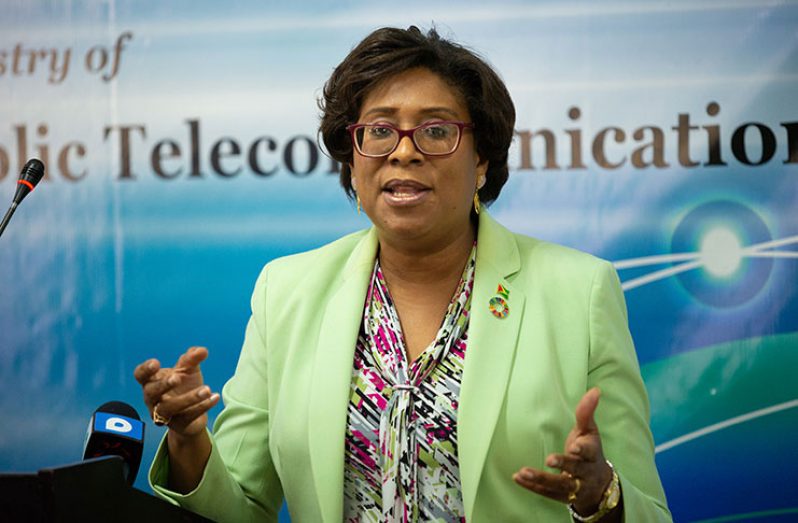— but eagerly await liberalised telecoms environment
— want to invest in infrastructure and hinterland areas, says Min Hughes
MINISTER of Public Telecommunication, Cathy Hughes, has indicated that several companies are eagerly awaiting the liberalisation of Guyana’s telecommunications environment, and are prepared to invest in developing infrastructure and the hinterland areas.
“Especially over the last year, I’ve had several companies that come to me who want to know if they’re gonna be able to get a licence, for example, to build another subsea cable,” Minister Hughes told the Guyana Chronicle in a recent interview.
“We’ve had companies from Suriname, companies from the U.S. and even a company from Brazil that has expressed interest in bringing a cable from Brazil into Lethem and the Rupununi,” she disclosed.
This interest is of particular importance, since as the minister stressed, there is still a great demand for connectivity in many parts of the country, especially in hinterland and rural areas where there is now limited connectivity.
“We’ve had Cable and Wireless, which is very strong in the rest of the Caribbean, express an interest in coming into the Guyana market,” she reminded also.
Vice-President Dennis Waters of Cable and Wireless had paid a courtesy call on Minister Hughes in 2018, when he presented her with his country’s plans for potential investment in the local telecommunications sector.
In July 2016, the incumbent government passed the Telecommunication (Amendment) Bill to liberalise the Telecoms sector by ending the monopoly which the Guyana Telephone and Telegraph Company (GTT) had enjoyed for over 25 years.
This monopoly, as explained by Minister Hughes, means that GTT has a legal contract that states that there no other players allowed in the market.
“And it meant that therefore if you wanted to internet service for example, the Internet Service Providers (ISPs) would have to go to GTT and buy bandwidth and resell it to you as a citizen or their business customers,” she said.
However, she indicated that for many years, the government has been trying to liberalise the sector.
NEED COMPETITION
“Our philosophy as a government was that we needed to have competition in there [the telecommunications sector]. Competition, we feel, brings down the price and improves the quality,” Hughes shared.
She also noted: “Liberalisation means that if you wanted to open up a company, if you wanted to pay and put the infrastructure in place, then you could be able to operate very much the way GTT operates [and] would be able to apply for a licence and you would be given that.”
Just recently, GTT signed a non-binding Memorandum of Understanding (MoU), which will see the continuation of discussions on all outstanding issues between the bodies, with the aim of reaching a binding agreement.
“I’m very happy that we came to that MoU because that was kind of a declaration that in many areas we’ve got some agreement,” she shared, but also underscored: “I’ll be the first to say that it [liberalisation] has taken much longer than we would’ve expected.”
PROCESS
Once this process is finally completed, she indicated that it is then that the ministry would be able to say to potential investors that they can enter Guyana’s market.
The minister also shared her belief that with a liberalised environment, investors that come with the better business plan can put the infrastructure in place at the best price and can provide good service at a competitive price would be able to succeed.
She also related, “What we want to make sure is that if you want a licence to just provide cell service in Lethem or Mabaruma, or to provide internet service to any particular area, then the technology and our new licensing system would allow you to apply and be granted a licence.”
However, she also explained that due diligence is being given to the liberalisation process, so that no “injustice” is done to Guyanese, particularly since the landline technology is on the decline and mobile technology is on the rise — with the need for better connectivity and services.
“If we look to the future, a lot of the companies that are interested in coming into Guyana are going to operate the same way that Verizon in the U.S. and other companies would operate,” Hughes said.
She added: “Those companies are bringing into a house what they call fibre to the home — an internet connection that’s strong and reliable, and quite often what they are doing now is bringing cable TV in the same connection.”
The telecommunications minister noted too, “I am quite hopeful and optimistic that the parties that are going to come into Guyana, that’s where they are thinking; they are looking to the technologies of the future.”




.jpg)









